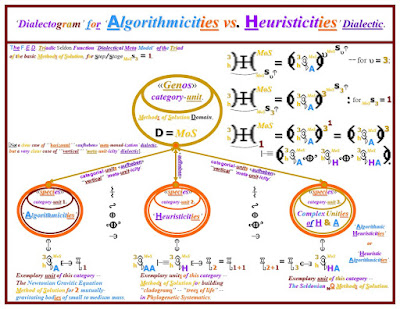Part 12:
The Seldon Dialogues, Excerpts --
Dialectics
as a Heuristic
«Organon».
Dear Reader,
FYI --
It is my pleasure, and my
honor, as an Officer of the Foundation
Encyclopedia
Dialectica [F.E.D.]
Office of Public Liaison, to share with you, from time to time, as they are approved
for public release by the F.E.D. General Council, key
excerpts from the internal writings, and sayings, of our
co-founder, Karl Seldon.
The twelfth such release in this series is pasted in
below [Some E.D. standard edits have been applied, in the version presented below, to the direct
transcript of our co-founder’s discourse].
ENJOY!
Regards,
Miguel Detonacciones,
Member, Foundation Encyclopedia
Dialectica [F.E.D.],
Officer, F.E.D. Office of Public Liaison.
“... dialectics is a heuristic, not a guarantee of adherence to the «arché»-category/contra-category/uni-category/... pattern in every last instance.”
“ ‘‘‘Universality’’’
does not imply ‘exceptionlessness’.”
“Nevertheless, we can educe many evidences supporting an
expectation that such adherence will be frequent, not only in the synchronic context, but in the diachronic context, and in the diachronico-synchronic context as well. ...”
“. . . If a given kind is the first born of its ‘‘‘lineage’’’, and if it is born with ‘intra-duality’ or ‘self-duality’, then it will, at some length,
divulge and disgorge its
own other, its other kind. Then, at yet further length from its time of birth, as these now two,
kinds develop [in] their mutual
otherness, some of both will eventually merge, will re-unify
in a way that
exceeds their
earliest, primitive undifferentiated
unity, in
which the other
was still occulted,
when there was only one
manifest kind,
and not, as now, three manifest kinds.
...”
“. . . The ontology of our «kosmos» grows monadically, by means of
expandedly reproducing individual units that are also agents
of ontological change -- historical [proto-]subjects, catalyzing
‘onto-dynamasis’.”
“But the -- limited -- human mind cannot follow each of
these agents individually and all at once.”
“The human mind can, instead, best grasp groups --
grasp the [self-]movements of myriads of «monads» by means
of «arithmoi», that is, of “kinds” [i.e., of «gene» and of
«species», etc.], that is, of ‘‘‘kind categories’’’, or
‘‘‘ontological categories’’’, and of the ‘birthings’ of new ‘‘‘ontological
categories’’’ from out of the midst of themselves. . . .”


No comments:
Post a Comment